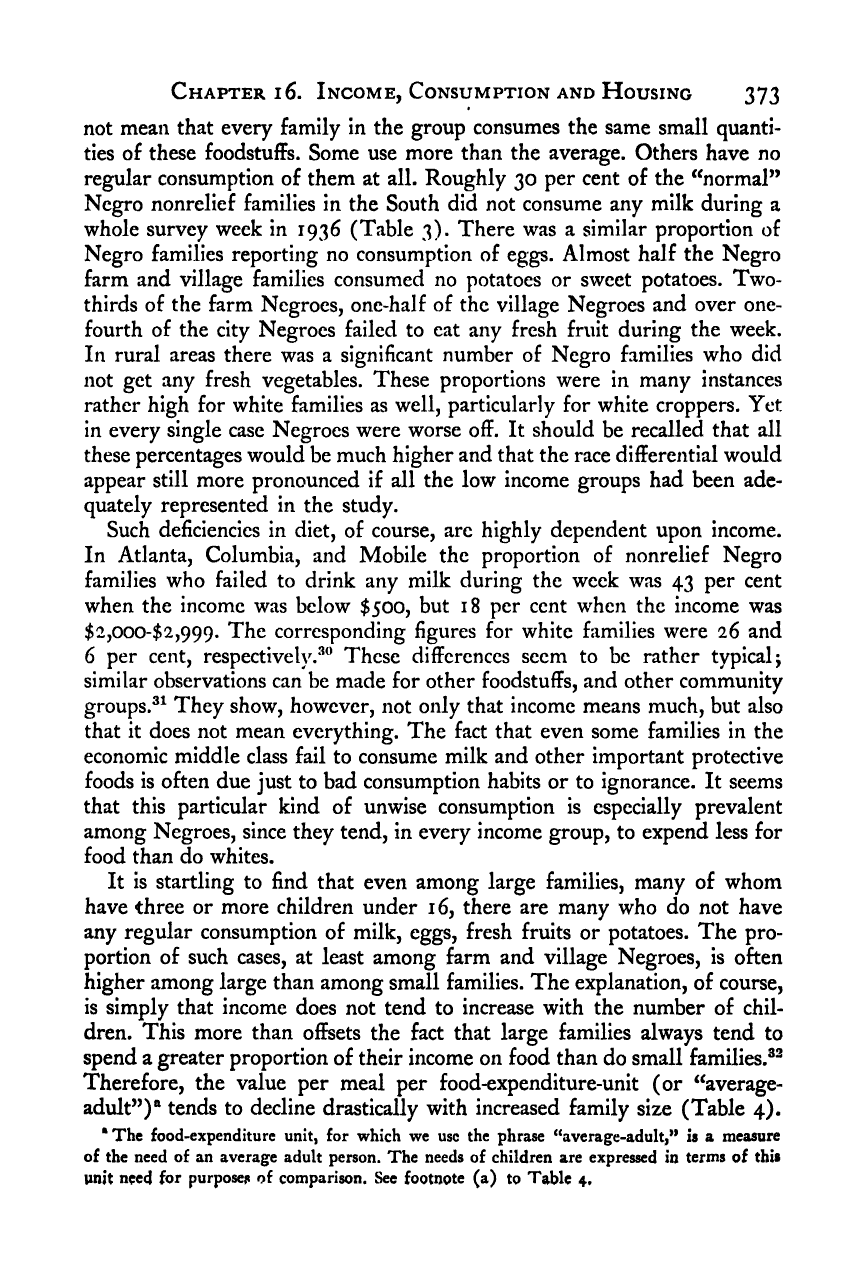Note: Gunnar Myrdal died in 1987, less than 70 years ago. Therefore, this work is protected by copyright, restricting your legal rights to reproduce it. However, you are welcome to view it on screen, as you do now. Read more about copyright.
Full resolution (TIFF) - On this page / på denna sida - IV. Economics - 16. Income, Consumption and Housing - 5. Food Consumption

<< prev. page << föreg. sida << >> nästa sida >> next page >>
Below is the raw OCR text
from the above scanned image.
Do you see an error? Proofread the page now!
Här nedan syns maskintolkade texten från faksimilbilden ovan.
Ser du något fel? Korrekturläs sidan nu!
This page has never been proofread. / Denna sida har aldrig korrekturlästs.
Chapter i6. Income, Consumption and Housing 373
not mean that every family In the group consumes the same small quanti-
ties of these foodstuffs. Some use more than the average. Others have no
regular consumption of them at all. Roughly 30 per cent of the “normal”
Negro nonrelief families in the South did not consume any milk during a
whole survey week in 1936 (Table 3). There was a similar proportion of
Negro families reporting no consumption of eggs. Almost half the Negro
farm and village families consumed no potatoes or sweet potatoes. Two-
thirds of the farm Negroes, one-half of the village Negroes and over one-
fourth of the city Negroes failed to eat any fresh fruit during the week.
In rural areas there was a significant number of Negro families who did
not get any fresh vegetables. These proportions were in many instances
rather high for white families as well, particularly for white croppers. Yet
in every single case Negroes were worse off. It should be recalled that all
these percentages would be much higher and that the race differential would
appear still more pronounced If all the low income groups had been ade-
quately represented in the study.
Such deficiencies in diet, of course, arc highly dependent upon income.
In Atlanta, Columbia, and Mobile the proportion of nonrelief Negro
families who failed to drink any milk during the week was 43 per cent
when the income was below $500, but 18 per cent when the income was
$2,000-$2,999. The corresponding figures for white families were 26 and
6 per cent, respectively.*’^^’ These differences seem to be rather typical j
similar observations can be made for other foodstuffs, and other community
groups.^^ They show, however, not only that income means much, but also
that it does not mean everything. The fact that even some families in the
economic middle class fail to consume milk and other important protective
foods is often due just to bad consumption habits or to ignorance. It seems
that this particular kind of unwise consumption is especially prevalent
among Negroes, since they tend, in every income group, to expend less for
food than do whites.
It is startling to find that even among large families, many of whom
have three or more children under 16, there are many who do not have
any regular consumption of milk, eggs, fresh fruits or potatoes. The pro-
portion of such cases, at least among farm and village Negroes, is often
higher among large than among small families. The explanation, of course,
is simply that income does not tend to increase with the number of chil-
dren. This more than offsets the fact that large families always tend to
spend a greater proportion of their income on food than do small families.®^
Therefore, the value per meal per food-expenditure-unit (or “average-
adult”)® tends to decline drastically with increased family size (Table 4).
‘The food-expenditure unit, for which we use the phrase “average-adult,” is a measure
of the need of an average adult person. The needs of children are expressed in terms of this
unit need for purposes of comparison. See footnote (a) to Table 4,
<< prev. page << föreg. sida << >> nästa sida >> next page >>